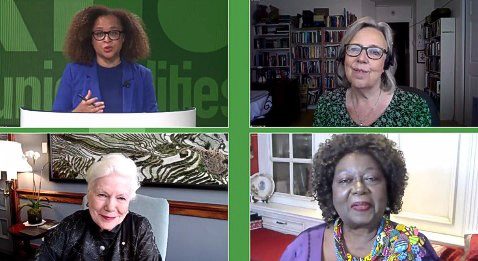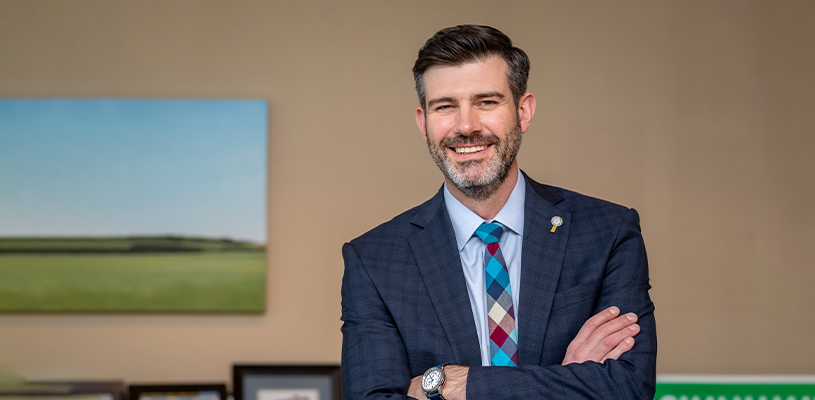AMO forum offers insights into women’s leadership, COVID recovery
 Champions of the political realm: Nam Kiwanuka, Elizabeth May, Elizabeth Dowdeswell, and Jean Augustine (top left to bottom right) discuss how the political system can be more welcoming for women and women of colour to enter politics.
Champions of the political realm: Nam Kiwanuka, Elizabeth May, Elizabeth Dowdeswell, and Jean Augustine (top left to bottom right) discuss how the political system can be more welcoming for women and women of colour to enter politics.
At a time when the call is to bring more women into the political realm, the reality is that too many are being pushed out.
High-profile figures like Catharine McKenna and Jody Wilson-Raybould have acknowledged that Parliament isn’t the place for their voice. McKenna has had to deal with misogynistic slurs and threats on social media. She has even had graffiti scrawled on her constituency office. Wilson-Raybould has said that she feels there has been a regression in Parliament. Calling it a toxic environment, she said politics is “increasingly a disgraceful triumph of harmful partisanship over substantive action.”
Green Party Leader Annamie Paul has been in the media recently facing attacks on her leadership style. The question has been raised about whether she would be facing these challenges if she wasn’t a racialized woman.
Women’s Leadership Forum
Many women have made significant strides inside politics. Although they have all faced adversity, they are still championing the political realm. This is especially true when it comes to the topic of women in local government.
During the recent Association of Municipalities of Ontario (AMO) virtual conference, TVO personality Nam Kiwanuka hosted a panel discussion on women’s leadership. Taking part were:
- Ontario Lieutenant Governor Elizabeth Dowdeswell;
- Jean Augustine, the first Black Canadian woman elected to the House of Commons; and
- Elizabeth May, former leader of the Green Party and MP for the riding of Saanich–Gulf Islands.
Support for Women in Politics
How can the political system be more welcoming for more women, and women of colour, to enter politics?
Dowdeswell said that she sees “cracks in our democracy.” She also said that it is important people understand that democracy is not simply about government or even voting.
“It’s really about how we choose to live our lives together, how we make decisions together,” she said. “And that’s why for me, the local level, the municipal level of government, is so very important.”
Dowdeswell said that she’s had many Zoom calls with women mayors during the pandemic. The conversation, she explains, was always honest and raw. There was also a humility and a vulnerability. These “remarkable stories,” she said, offer insights into the difficult problems people are facing. But also they are “wonderful stories of courage.” And that, she said, is where people need to turn toward – their home community.
Media coverage often goes to the province or federal governments, but that is why, Dowdeswell said, it can be best for young women to begin their political careers in their home communities.
“For one thing, you can make a difference. You can really see things happen. And you can make mistakes. You can learn from those lessons much more easily when you’re not on a national stage,” she said. “I think that that women have such a valuable role to play. And that’s a good starting point. Often that is where real things have happened. Because those are your neighbours.”
Women at the Political Table
Augustine said that the local level is the starting point for women in many different ways. It is here, she explains, where people begin to understand the community and to know responsibility for a community.
Women have had life experiences that they bring to the table. From there they can decide how best to use those life experiences and provide leadership. And at the same time, there needs to be a push toward ensuring that women are given responsibility. This can be seeing women brought forward as council leaders, committee chairs, or in whatever forum where decisions are being made.
“Women should be at the table. They should be in the committee rooms where the major decisions are made, especially around funding programs and other things that matter to community,” Augustine said. “These women, and the leadership qualities of those women, have to be brought from the margins into the centre. That way, when we move forward, we move forward as a diverse and inclusive society.”
Local Government Lens
May said that she is a “big fan” of the municipal order of government. She acknowledges that this may sound odd given she chose to focus on federal politics, but even so, she has loved every interaction she has had with the municipal order of government.
This is particularly true of the time before she became a member of the Green Party. May was working with the Federation of Canadian Municipalities in setting up a program for climate action. This showed her the municipal order of government has done more on climate action than any other.
And a lot of that, May said, has been through the creativity and leadership of women.
“It’s absolutely the case that women in leadership and women getting involved in elected office will find it less partisan, less unpleasant, get more done at the municipal order of government than you often find at the provincial or the federal, “she said. “If we can scale back the partisanship, the hyper-partisanship, and the sniping, that will create the climate that does attract more women.”
Unfortunately, May said, the truth is that, about a year ago, Canada reached a somewhat dubious milestone. Canada had 100 women in Parliament. But that, she said, is still “less than a third of the way” behind other countries around the world. She was quick to add that means there remains a lot of work to be done.
How to Build Back Better
There has been a lot of attention as of late about building back better in a post-pandemic world. For Dowdeswell, May, and Augustine, key questions must be answered. These questions range from addressing social inequity to fighting for a more inclusive future.
Dowdeswell has seen how people have been able to pivot to make faster decisions during the pandemic. This has been key to reducing bureaucracy. Most critical is acknowledging that there won’t be a prosperous economy unless Canadians deal with what used to be known as women’s issues.
May agreed, but added that she also has a sense of “monumental failure” around climate change. After all, her daughter – who is now 30 – wasn’t even a year old when the United Nations Framework Convention on Climate Change was signed in Rio de Janeiro, Brazil.
“I feel despair for fighting all the time because our children’s future is hanging by a thread and we have months not years to address it. So I am, at this point, a cranky 67 year old. I’m not letting anybody off the hook anymore,” May said. “Incrementalism doesn’t cut it. We have to be serious about the climate crisis in the same way we were about COVID. And that means that we have to actually walk the talk in this country.”
Hope for an Inclusive Future
Augustine said that she feels hopeful and optimistic about lessons learned during the pandemic. This includes a better understanding of what it means to be an essential worker. It has also identified who are the haves and have-nots in our communities.
This also includes points to how communities can move forward around fairness, equity, and justice.
“How we need to address those very serious issues and face them head on in this global village,” Augustine said. “I have worked with young people and those decision makers would have something coming out of these conversations. Moving this forward, that will take us on a mantra – diversity and inclusion, equity and fairness, and then we suddenly realize that we were all in this together.” MW
✯ Municipal World Insider and Executive Members: Thank you for supporting Municipal World. We are working on a detailed member survey to be released later this year to ensure we are serving your needs. Please send any feedback directly to Municipal World Editor and Publisher Scott Vokey at scott@municipalworld.com in the meantime.
Sean Meyer is Senior Content Editor for Municipal World.
Related resource materials:



